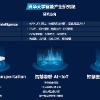The increasing rates of global urbanization and vehicle usage are leading to a shift of mobility to the third dimension-through Advanced Air Mobility (AAM)-offering a promising solution for faster, safer, cleaner, and more efficient transportation. As air transportation continues to evolve with more automated and autonomous systems, advancements in AAM require a deep understanding of human-computer interaction and human-AI collaboration to ensure safe and effective operations in complex urban and regional environments. There has been a significant increase in publications regarding these emerging applications; thus, there is a need to review developments in this area. This paper comprehensively reviews the current state of research on human-computer interaction and human-AI collaboration in AAM. Specifically, we focus on AAM applications related to the design of human-machine interfaces for various uses, including pilot training, air traffic management, and the integration of AI-assisted decision-making systems with immersive technologies such as extended, virtual, mixed, and augmented reality devices. Additionally, we provide a comprehensive analysis of the challenges AAM encounters in integrating human-computer frameworks, including unique challenges associated with these interactions, such as trust in AI systems and safety concerns. Finally, we highlight emerging opportunities and propose future research directions to bridge the gap between human factors and technological advancements in AAM.
翻译:暂无翻译





